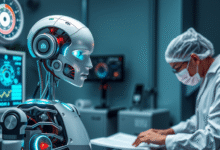AI in Healthcare: What It Means for Your Daily Wellness
AI in healthcare transforms daily wellness with personalized health tracking and smart virtual assistants. Discover the future of proactive care.

Artificial Intelligence (AI) in healthcare is transforming how we approach our well-being, offering innovative solutions that enhance daily wellness through smarter, more personalized care. From advanced diagnostics to AI-powered health monitoring, this technology is making healthcare more proactive and accessible than ever before. By analyzing vast amounts of data in real time, AI helps detect health issues early, recommends tailored treatments, and even predicts potential risks empowering individuals to take control of their health like never before.
The integration of AI in healthcare goes beyond hospitals and clinics, extending into our everyday lives through wearable devices, virtual assistants, and mobile health apps. These tools track vital signs, provide real-time feedback, and offer personalized Daily Wellness insights, making it easier to maintain a healthy lifestyle. Whether it’s managing chronic conditions, improving fitness routines, or receiving instant medical advice, AI is reshaping the future of daily wellness, ensuring that healthcare is not just reactive but truly preventive and personalized.
What It Means for Your Daily Wellness
The Role of AI in Modern Healthcare
AI-Powered Personalized Medicine
Personalized medicine is one of the most promising applications of AI in healthcare. By analyzing a patient’s genetic makeup, lifestyle factors, and medical history, AI can recommend tailored treatment plans that improve outcomes. Beyond treatment, AI also plays a crucial role in preventive healthcare. Predictive analytics can assess an individual’s risk of developing chronic conditions like diabetes or heart disease, allowing for early interventions. Apps powered by AI chatbots provide personalized Daily Wellness tips, reminding users to take medications, hydrate, or exercise, fostering healthier habits.
Virtual Health Assistants and Telemedicine
The rise of telemedicine has been accelerated by AI, making healthcare more accessible. Virtual health assistants, such as AI-powered chatbots, offer 24/7 medical support, answering questions, scheduling appointments, and even providing mental health counseling. These tools reduce the burden on healthcare providers while ensuring patients receive timely advice. AI also enhances remote patient monitoring, particularly for elderly or chronically ill individuals. Smart devices equipped with AI algorithms can detect falls, monitor blood pressure, and alert caregivers in emergencies. This technology enables aging in place, allowing seniors to maintain independence while staying connected to medical professionals.
AI in Medical Research and Drug Development
The traditional drug discovery process is time-consuming and costly, but AI is streamlining it. By analyzing biomedical data, AI can identify potential drug candidates faster than human researchers. Pharmaceutical companies now use AI-driven simulations to predict how new drugs will interact with the human body, speeding up Clinical trial and reducing costs. Moreover, AI aids in epidemiological research by tracking disease outbreaks and predicting their spread. During the COVID-19 pandemic, AI models helped governments allocate resources, develop vaccines, and implement containment strategies. This capability is crucial for managing future public health crises.
Challenges and Ethical Considerations
Despite its benefits, AI in healthcare faces challenges, including data privacy concerns. Since AI relies on vast amounts of patient data, ensuring cybersecurity and compliance with regulations like HIPAA is essential. There’s also the risk of algorithmic bias, where AI systems may produce skewed results if trained on non-diverse datasets. Another concern is the human-AI collaboration in healthcare. While AI can assist doctors, it cannot replace human empathy and clinical judgment. Striking the right balance between automation and human oversight is critical to maintaining trust in AI-driven healthcare solutions.
The Future of AI in Daily Wellness
Personalized Health Monitoring
AI will revolutionize personal health tracking through advanced wearables that analyze real-time biometric data like heart rate, sleep patterns, and blood sugar levels. These devices will provide tailored recommendations for diet, exercise, and stress management, creating a 24/7 wellness coach on your wrist. Future iterations may even detect early signs of illness before symptoms appear.
AI-Powered Predictive Healthcare
Using machine learning algorithms, AI will predict health risks by analyzing genetic data, lifestyle habits, and environmental factors. This shift from reactive to preventive care could reduce chronic diseases by prompting early interventions. Insurance companies may leverage this data to offer customized Daily Wellness plans that reward healthy behaviors.
Smart Home Wellness Ecosystems
Homes will integrate AI-driven health tech like air quality sensors, smart mirrors with facial diagnostics, and refrigerators that suggest nutrient-balanced meals. These systems will sync with wearables to create a holistic wellness environment, automatically adjusting lighting and temperature for optimal sleep and recovery.
Virtual Health Assistants
Next-gen AI chatbots will offer mental health support, using natural language processing to detect anxiety or depression cues in speech patterns. Combined with VR therapy sessions, these tools will make emotional wellness more accessible, reducing the stigma around seeking help.
AI in Nutrition
Future apps will use computer vision to analyze meals and provide instant nutritional feedback, while AI trainers will design hyper-personalized workouts adapting to your recovery needs and fitness goals. Integration with grocery delivery services could auto-order supplements based on your health data.
Ethical Challenges
As AI permeates wellness, debates will intensify around data privacy, algorithmic bias, and over-reliance on technology. The key challenge lies in maintaining human oversight while harnessing AI’s potential to democratize healthcare access globally.
Read More: Affordable Health Gadgets Under $50 That Actually Work
Conclusion
AI in healthcare has undeniably revolutionized how we approach our daily wellness, offering smarter, more personalized solutions that put preventive care within everyone’s reach. From early disease detection through advanced diagnostics to real-time health monitoring via wearable technology, AI empowers individuals to take proactive control of their wellbeing. As these technologies continue to evolve, we can expect even more seamless integration of AI into our healthcare routines, making personalized medicine and predictive health insights the new standard.
The future of AI in healthcare promises a world where Daily Wellness is not just reactive but continuously optimized through intelligent, data-driven solutions. While challenges like data privacy and ethical considerations remain, the potential benefits for daily wellness – from customized treatment plans to AI-powered health assistants are too significant to ignore. As we embrace this technological transformation, we’re moving toward a healthcare paradigm that’s more accessible, efficient, and tailored to each individual’s unique needs, ultimately redefining what it means to live a healthy life.
FAQs
How does AI improve daily wellness in healthcare?
AI enhances daily wellness through personalized health insights, real-time monitoring via wearables, and predictive analytics that help prevent illnesses before they occur.
Is AI in healthcare safe and private?
While AI offers advanced care, data security and patient privacy remain priorities, with strict compliance to regulations like HIPAA to protect sensitive health information.
Can AI replace doctors in healthcare?
No, AI supports doctors by improving diagnostic accuracy and treatment plans, but human expertise and compassionate care remain irreplaceable.
What are the most common AI healthcare tools for daily wellness?
Popular tools include AI-powered fitness apps, smart wearables, virtual health assistants, and telemedicine platforms that provide on-demand medical advice.
How will AI shape the future of personal healthcare?
AI will enable proactive wellness, with predictive diagnostics, customized treatment plans, and automated health tracking becoming standard for maintaining optimal health.











